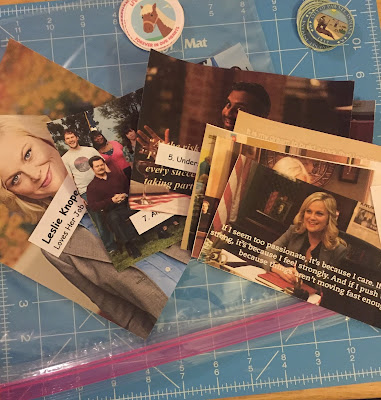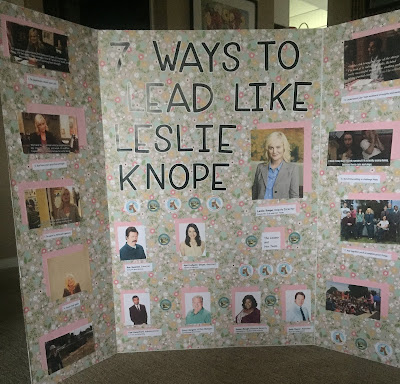 |
| Gathering the pieces for my "Parks and Recreation"-inspired presentation. |
I'm sharing the text from my presentation here because I'm pretty proud of it (and the board I created) and because I'd like to express my continued appreciation to the people who brought this smart, passionate, diligent, honest, creative, optimistic, loyal woman to life for seven seasons, including creators Mike Schur and Greg Daniels, actress/writer/producer/director Amy Poehler, and every writer and director who furthered Leslie's story throughout the show's run. Thank you for giving the world such an incredible character and providing me with the inspiration for my presentation.
 |
| My board for the presentation of the "7 Ways to Lead Like Leslie Knope." |
7 Ways to Lead Like Leslie Knope
I love “Parks and Recreation,” the mockumentary-style sitcom that ran on NBC from 2009–15. I watched the show faithfully throughout its run. I have the book “Pawnee: The Greatest Town in America,” written by the show’s writing staff and attributed to main character, Leslie Knope. I have a Li’l Sebastian stuffed animal, the show’s beloved local-celebrity mini horse. Even though I have every season on DVD, and can binge when I want on Hulu, I will stop to watch an episode that pops up on TV.
The show documents the work and home lives of the staff in the parks and recreation department for the fictional small town of Pawnee, Indiana. The team is led by Deputy Director Leslie Knope, played by Amy Poehler (also a writer, producer and director on the show), and, to a lesser extent, Director Ron Swanson, played by Nick Offerman. Leslie is the optimistic striver. Ron’s libertarian leanings inspire him to dismantle the government from the inside. There’s a disaffected intern who later becomes an often-apathetic permanent staffer. There’s the ambitious assistant who mainly cares about what his job can do for him. There’s the veteran staff member keeping his head down as he nears retirement. There’s the staffer who always gives 100 percent but has many other priorities besides work. There’s the newbie who has tons of enthusiasm and almost no skills.
This felt like an ideal workplace to dissect for my presentation. How do you get people with different values and work styles to come together and achieve big goals? Over the course of the show, Leslie Knope found a way to do just that while wrestling with many of the challenges we’ve discussed in this class — shrinking budgets, changing leadership, shifting organizational priorities. I went back through the show to see what I could learn from Leslie’s example and from that this list of “7 Ways to Lead Like Leslie Knope” was created. Similar to Stephen Covey’s “7 Habits for Managers,” Leslie’s management principles start with her own attitudes and actions, and then extend out to what she can do for her team.
Here’s my list of the “7 Ways to Lead Like Leslie Knope.”
1. Be passionate about your job.
Leslie loves her job. She truly believes she lives in the greatest town in the world and is honored to serve its citizens. Leslie’s passion for her job is contagious and helps her rally her team when facing tough challenges, like when the parks department put their jobs on the line to produce the Harvest Festival, an event they hoped would reinvigorate the bankrupt Pawnee. We may not all love our jobs as much as Leslie does but we likely all have aspects of our jobs that we love. Supervising my student team is the best part of my job, and I believe the excitement and pride I have for the work they do provides them with encouragement.
2. But have your priorities straight.
One of my favorite quotes from Leslie is: “We have to remember what’s important in life: friends, waffles and work. Or waffles, friends, work. It doesn’t matter, but work is third.” Even for someone as career-driven as Leslie, work isn’t the main priority in her life. It likely isn’t for your team either and shouldn’t be for us as supervisors. I had a boss who remarked that work-life balance is a myth. She’s right. Depending on what’s happening at work or home, one is going to take more focus and energy than the other. Though we can’t achieve perfect balance, we do need to find that work-free space in our lives where we can relax and recharge.
3. Be open to different opinions.
A trademark of “Parks and Recreation” was the town meetings where Pawnee residents would loudly, passionately air their grievances with everything from the choice of board games at the rec center to the benefits of hand dryers over paper towels. Residents would also stop by the parks department office to share their opinions. Leslie and her team gave each resident their time, and sometimes good ideas came from these interactions. One resident’s request to add the “Twilight” books to a town time capsule led to the creation of an outdoor movie night. In our own jobs, we never know where a great idea could come from or who may provide the feedback that could help make our own good idea great.
4. Have clear goals.
“Parks and Recreation” begins with a resident complaining about an undeveloped pit in her neighborhood. Leslie vows to turn it into a park, a project that’s a major plot point throughout the show’s early seasons. Decisions are made because they could help lead to the park being built, like the parks department helping track down an opossum on a golf course to curry favor with the mayor. As we’ve learned from Covey, having clear goals is essential to good management, it gives our teams something to focus on and rally around. With my own team, which manages the social media accounts for Undergraduate Admissions, we have the long-term goal of getting more followers for our Instagram account — @lifeatucr — than the official university site has. That goal drives my team to brainstorm new contests, partnerships and campaigns to increase engagement and attract new followers. Though we have a ways to go before achieving our goal, around 4,000 followers, it is sparking my students’ creativity. Because I work with students, I also have a personal goal that when my students leave my team, they will be ready to step right into a professional job.
5. Understand your team members’ strengths and weaknesses.
Leslie clearly saw what her teammates, including her director, could offer and what limitations they had. Department Administrator Tom Haverford, played by Aziz Ansari, was a networker, so Leslie knew she could rely on him to smooth things over with the press. She also knew that her director Ron was not comfortable interacting with the public, so she would happily step in for him at meetings. Ideally we’d make all of our assignments based on our team members’ skills, interests and passions. With my own student team, I’ve had natural leaders who I could task with leading meetings and planning editorial calendars, and have loved watching them shine in those roles.
6. But still be willing to challenge them.
Parks department assistant April Ludgate-Dwyer, played by Aubrey Plaza, was young, apathetic and smart, often making good suggestions but having little interest in putting in the work to make her ideas a reality. Though April was happiest doing the very least she could in the office, Leslie recognized her potential, so when April suggested hosting an animal adoption event in a local park, Leslie tasked her with organizing it. We should encourage our team members to stretch outside their comfort zones so they’ll stay engaged. In my own career, I’ve appreciated the times when a supervisor gave me a challenging task, encouraging me to develop new skills and showing they had faith in my ability. As I’ve slowly delegated more with my own team, I’m giving them more challenging tasks and also challenging myself to step back and be the supervisor, not the worker.
7. And together you’ll accomplish great things.
The second season of “Parks and Recreation” ended with Pawnee on the brink of bankruptcy, the government forced to temporarily close. Budgets were going to be slashed and some departments eliminated altogether. The closure happens just when an annual summer kids’ concert was supposed to take place. Undeterred by their government’s closure, and a total lack of funds, the parks department rallies together to put on the concert, with support from local businesses. Not knowing the future of her department, Leslie thanks her team for giving their time to put on the concert, without pay, saying, “You guys are the best, most important people in the most important government in the best city in the world.”
Having the faith and support of your supervisor can make you feel like you can take on most challenges. I’ve experienced that myself. With my own team, I do believe we will one day have more followers than the official UCR Instagram account. I also believe that after they graduate, each of my students will be star staff members at their first post-college jobs.
Putting together this list, I’ve realized how many of Leslie’s best practices align with what we’ve learned throughout the class. Through BCSC, I’ve been able to tap into my inner Leslie Knope and am empowered to be the very best supervisor for my students.
No comments:
Post a Comment